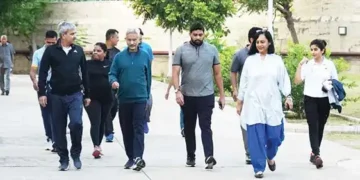NC Bipindra
THE everlasting image of Shanghai Cooperation Organisation (SCO) Summit held in Islamabad will be External Affairs Minister S Jaishankar on his morning walk inside Indian High Commission campus accompanied by the country’s diplomats and staffers. At least, this is the memory that Indians would carry for long.
First, Jaishankar’s morning walk sends out clear message to the world. India and its political leadership care little for the epicentre of terrorism. Second, it also reaffirms Jaishankar’s ‘cool dude’ image and India’s best spokesperson on international affairs. This is not to trivialise serious issues flagged by Jaishankar at the summit, standing in for India’s Prime Minister Narendra Modi, who skipped the conglomeration.
Pakistan may have miserably failed to achieve its former dictator Zia-ul-Haq’s dream of ‘bleed India with a thousand cuts’, but Pak-funded terror groups have indeed bled India through several terror strikes.
Pak as terror hub
Pakistan has been a haven for global terrorists including the 9/11 mastermind Osama bin Laden. No wonder, Jaishankar’s message at the SCO Summit was significant and critical over terrorism, separatism and extremism. Pakistan has encapsulated the dictionary definition of all the three undesirable traits for a nation that Jaishankar highlighted at the meeting. The world has recognised Pakistan as hub of global terrorism – Islamabad epitomises separatism by igniting fires in Kashmir and Punjab that has Hindus, Buddhists and Jains as minority population and promoted Islamic extremism the world over directly and through its proxies.
Notably, Communist China has been siding with terrorism, separatism and extremism. Pakistan Prime Minister Shahbaz Sharif and Communist China Premier Li Qiang had a bilateral meeting in Islamabad on the sidelines and the outcome statement from that meeting mentions Kashmir unimaginatively.
Beijing insists that the world should uphold its ‘One China’ policy, whereas it is unwilling to concede ‘One India’ that’s surreal. “If trust is lacking or cooperation inadequate, if friendship has fallen short and good neighbourliness is missing somewhere, there are surely reasons to introspect and causes to address.
Equally, it is only when we reaffirm our commitment most sincerely to the Charter that we can fully realise the benefits of cooperation and integration that it envisages,” Jaishankar said at the meeting.
These words must have hit home where it was directed at: China and Pakistan, for all their unfriendly acts against India, their SCO partner.
“However, cooperation must be based on mutual respect and sovereign equality. It should recognise territorial integrity and sovereignty. It must be built on genuine partnerships, not unilateral agendas. It cannot progress if we cherry-pick global practices, especially of trade and transit.”
Obviously, the target here was China-Pakistan Economic Corridor, a part of the China-driven Belt and Road Initiative (BRI).
A regional construct
SCO is an important regional construct for India, though it was a conception of China to strengthen its presence and influence in Central Asia. Jaishankar’s message to the 10-member grouping was powerful, asking them to have “an honest conversation” on what SCO charter aimed at.
SCO brings India opportunities to pursue its Connect Central Asia policy and gain access to strategic resources such as minerals, including uranium from Kazakhstan. India should also press for a robust SCO anti-terrorist structure for key information and intelligence-sharing on terrorism and drug running. Yet, challenges remain for India due to the grouping being perceived as an anti-West architecture. India faces military and diplomatic conflicts with China and Pakistan and that is an SCO spoiler.
Observer nation role
India should push for enhancing role of observer nations and dialogue partners apart from SCO’s engagement with other international and regional formations. India should also pursue Hindi as an official language at SCO.
India is a citizen-focused technology powerhouse through its digital payments interface and digital inclusiveness, which it can share with other SCO nations for their benefit. Jaishankar’s morning walk in Islamabad is amiable symbolism that India can walk the talk on its commitment of friendship with Central Asia nations, and its half-a-century long strategic partner Russia, a key member of the SCO. China and Pakistan can take a walk.


























